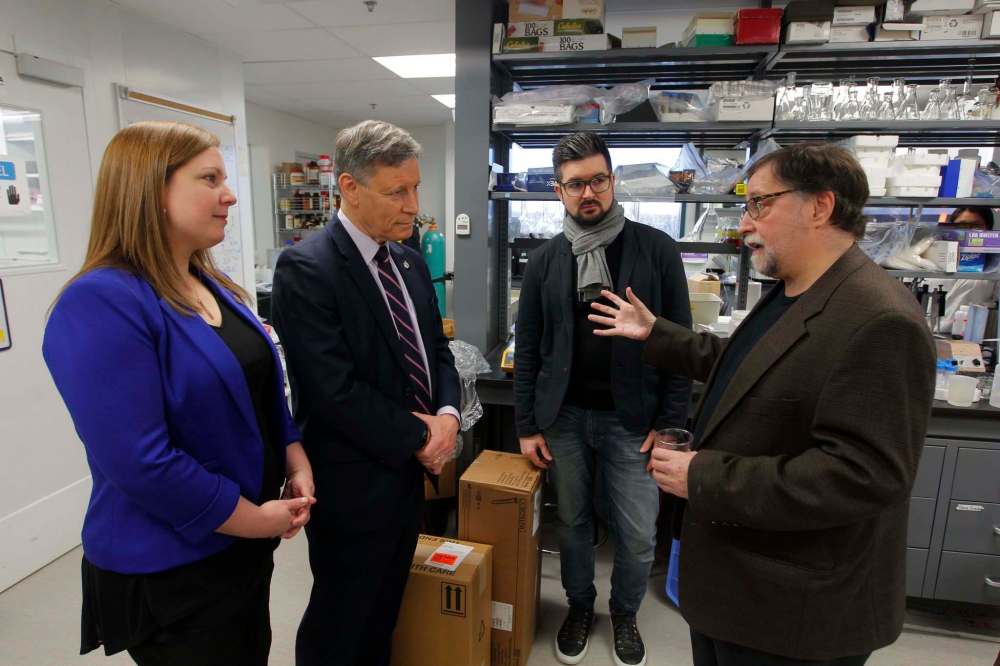U of M prof, Calgary research partner get $4M for Arctic oil-spill research
Advertisement
Read this article for free:
or
Already have an account? Log in here »
To continue reading, please subscribe:
Monthly Digital Subscription
$1 per week for 24 weeks*
- Enjoy unlimited reading on winnipegfreepress.com
- Read the E-Edition, our digital replica newspaper
- Access News Break, our award-winning app
- Play interactive puzzles
*Billed as $4.00 plus GST every four weeks. After 24 weeks, price increases to the regular rate of $19.00 plus GST every four weeks. Offer available to new and qualified returning subscribers only. Cancel any time.
Monthly Digital Subscription
$4.75/week*
- Enjoy unlimited reading on winnipegfreepress.com
- Read the E-Edition, our digital replica newspaper
- Access News Break, our award-winning app
- Play interactive puzzles
*Billed as $19 plus GST every four weeks. Cancel any time.
To continue reading, please subscribe:
Add Free Press access to your Brandon Sun subscription for only an additional
$1 for the first 4 weeks*
*Your next subscription payment will increase by $1.00 and you will be charged $16.99 plus GST for four weeks. After four weeks, your payment will increase to $23.99 plus GST every four weeks.
Read unlimited articles for free today:
or
Already have an account? Log in here »
Hey there, time traveller!
This article was published 16/01/2017 (3202 days ago), so information in it may no longer be current.
University of Manitoba professor Gary Stern will be aboard the Canadian Coast Guard research ship Amundsen in the spring on a journey of research and policy-making in the Arctic.
Stern and Casey Hubert of the University of Calgary are heading up a large-scale applied research project called Genice — genomics and ice — and are the primary recipients of $4 million in funding announced Monday by Research Manitoba and the Government of Canada.
“It’s very exciting and it’s a wonderful opportunity, ” said Stern, a professor in the U of M’s Centre for Earth Observation Science. He’ll be on the ship in Hudson Bay for about six weeks. “It’s very exciting to do something that is very applied.”

The funding is targeted for the four-year Genice project and related fields, which will use genomic approaches — studying the genetic material of microbes in sea ice — to address challenges to Canada’s natural resources as sea traffic increases in the Arctic.
Stern and Hubert’s research will focus on the protection of the Arctic environment. Goal include finding ways to prevent oil spills and best practices to clean them up, as well as policy-setting around oil spills and Arctic transportation.
“With the opening up of the Arctic, the massive losses of sea ice that we’re seeing, transportation through the Arctic is going to increase quite dramatically. With that, you have the potential for oil spills,” Stern said.
“Exploration right now in the Arctic is kind of on hold because of the low cost of oil, but it’s only a matter of time; it may be 10 or 12 years, but the exploration will happen at some point. We need to be ready,” he said.
“Our project Genice, not only looks at the science, we work very closely with policy-makers like the National Energy Board, Environment and Climate Change Canada, Fisheries and Oceans, the Coast Guard, to try to develop the policies that we need to provide the tools needed to help mitigate a spill, should it happen,” he said.
Stern, Hubert and other scientists will combine their expertise in the areas of genomics, microbiology, petroleomics and sea-ice physics to study oil degradation processes under controlled Arctic conditions to see how different crude and fuel oils interact with microbial populations in sea ice and the Arctic water.
Stern said the soon-to-be-completed Churchill Marine Observatory research facility will figure prominently in the project.
With northern shipping increasing by 166 per cent since 2004, and cruise ships and tourism increasing by 500 per cent in the past five years, Stern said there are increasing pressures on the Northwest Passage, a sea route connecting the northern Atlantic and Pacific oceans through the Arctic Ocean, along the northern coast of North America via waterways through the Arctic.
“Oil spills and other environmental disasters are a threat to Canada’s arctic marine environment,” Terry Duguid, parliamentary secretary to the minister of families, children and social development, said in a statement. “I’m pleased to see these issues are being tackled through genomics research here in Manitoba.”
ashley.prest@freepress.mb.ca
History
Updated on Monday, January 16, 2017 3:59 PM CST: Adds image.

